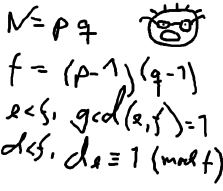poj2635--The Embarrassed Cryptographer(数论篇1,大数取模)
来源:互联网 发布:中日战略互惠关系知乎 编辑:程序博客网 时间:2024/06/05 03:11
The Embarrassed Cryptographer
Time Limit: 2000MS Memory Limit: 65536KTotal Submissions: 12496 Accepted: 3330
Description
 The young and very promising cryptographer Odd Even has implemented the security module of a large system with thousands of users, which is now in use in his company. The cryptographic keys are created from the product of two primes, and are believed to be secure because there is no known method for factoring such a product effectively.
The young and very promising cryptographer Odd Even has implemented the security module of a large system with thousands of users, which is now in use in his company. The cryptographic keys are created from the product of two primes, and are believed to be secure because there is no known method for factoring such a product effectively.What Odd Even did not think of, was that both factors in a key should be large, not just their product. It is now possible that some of the users of the system have weak keys. In a desperate attempt not to be fired, Odd Even secretly goes through all the users keys, to check if they are strong enough. He uses his very poweful Atari, and is especially careful when checking his boss' key.
Input
The input consists of no more than 20 test cases. Each test case is a line with the integers 4 <= K <= 10100 and 2 <= L <= 106. K is the key itself, a product of two primes. L is the wanted minimum size of the factors in the key. The input set is terminated by a case where K = 0 and L = 0.
Output
For each number K, if one of its factors are strictly less than the required L, your program should output "BAD p", where p is the smallest factor in K. Otherwise, it should output "GOOD". Cases should be separated by a line-break.
Sample Input
143 10143 20667 20667 302573 302573 400 0
Sample Output
GOODBAD 11GOODBAD 23GOODBAD 31
Source
Nordic 2005
题目要求:给出两个数k和l,k是由两个素数相乘得到,如果素数小于l,输出BAD 和那个素数,否则输出GOOD。
先打出素数表,其中一定要有大于100万的素数,把在l内的素数与k去模,其中k是10^100用到大数取余,将k分为三位数的段a[0] a[1],在计算
temp = a[0]%phi[i]
temp = (a[1]*1000+temp)%phi[i]
#include <cstdio>#include <cstring>#include <algorithm>using namespace std ;#define LL __int64char str[200] ;int n , a[100] , num ;int vis[2100000] , phi[1100000] , cnt ;void init(){ int i , j ; cnt = 0 ; memset(vis,0,sizeof(vis)) ; for(i = 2 ; i <= 2000000 ; i++) { if( !vis[i] ) phi[cnt++] = i ; for(j = 0 ; j < cnt ; j++) { if( i*phi[j] >= 2000000 ) break ; vis[i*phi[j]] = 1 ; if( i%phi[j] == 0 ) break ; } }}int f(int k){ LL sum = 0 , i , l ; for(i = num-1 ; i >= 0 ; i--) { sum = sum*1000 + a[i] ; sum %= k ; } if( sum == 0 ) return 1 ; return 0;}int main(){ int i , j , l , flag , s ; init() ; while( scanf("%s %d", str, &n) != EOF ) { if( strlen(str) == 1 && str[0] == '0' && n == 0 ) break ; l = strlen(str) ; memset(a,0,sizeof(a)) ; num = 0 ; flag = 0 ; for(i = l-1 ; i >= 0 ; i--) { flag++ ; if( flag == 3 ) { a[num] = (str[i]-'0')*100 + (str[i+1]-'0')*10 + ( str[i+2] -'0' ) ; num++ ; flag = 0 ; } } if( flag == 1 ) a[num++] = str[0] - '0' ; else if( flag == 2 ) a[num++] = (str[0] - '0') * 10 + str[1] - '0' ; for(i = 0 ; i < cnt ; i++) { if( phi[i] >= n ) break ; if( f(phi[i]) ) break ; } if( phi[i] >= n || i == cnt ) printf("GOOD\n") ; else printf("BAD %d\n", phi[i]); } return 0;} 0 0
- poj2635--The Embarrassed Cryptographer(数论篇1,大数取模)
- POJ2635--The Embarrassed Cryptographer--大数取模
- (POJ2635)The Embarrassed Cryptographer(大数取模)
- The Embarrassed Cryptographer poj2635 (大数取模)
- POJ2635 The Embarrassed Cryptographer 简单数论
- poj2635——The Embarrassed Cryptographer(高精度取模)
- poj2635 The Embarrassed Cryptographer
- POJ2635 The Embarrassed Cryptographer
- poj2635 The Embarrassed Cryptographer
- POJ2635 The Embarrassed Cryptographer
- POJ2635 The Embarrassed Cryptographer
- POJ2635----The Embarrassed Cryptographer
- poj2635 The Embarrassed Cryptographer
- POJ 2635 The Embarrassed Cryptographer 大数取模
- POJ2635 The Embarrassed Cryptographer (同余)
- POJ2635——The Embarrassed Cryptographer
- poj The Embarrassed Cryptographer(大数取模)(同余模定理)
- poj2635 The Embarrassed Cryptographer(高精度 同余取模)
- 小马哥---高仿苹果5S刷机 6589芯片高配版 详细拆机图与开机界面图。山寨精仿机 版本多,
- Android资源文件res的使用详解(strings,layout,drawable,arrays等)
- strcpy、strncpy与memcpy strchr 和 strstr的区别与使用方法
- vs2008 dump文件调试
- QTP几种特殊情况处理
- poj2635--The Embarrassed Cryptographer(数论篇1,大数取模)
- 牛刀小试 - 详解Java多线程
- Java线程:概念与原理
- i2c_probe()及I2C设备地址
- 戚薇怀孕没大肚子
- MFC中 TRUE FALSE NULL定义
- 敏敏笔试面试分享
- gerrit
- 解决ecshop退出登录会清空购物车的bug优化最完美方法


